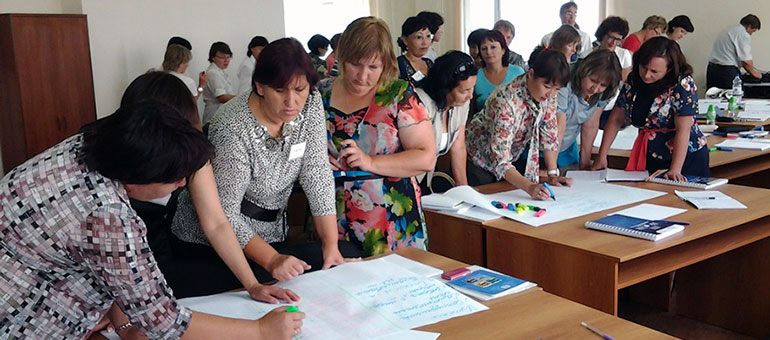
Informing Systemic Education Reform in Kazakhstan
Faculty of Education research enabled a successful programme of improvements and reforms to education in Kazakhstan from 2011-20.
The Faculty has been undertaking research in Kazakhstan since the early 2000s and works closely with Nazarbayev Intellectual Schools (NIS) and Nazarbayev University Graduate School of Education (NUGSE) to provide evidence and recommendations to support the positive development of Kazakhstani education system. Building on this, in 2014, members of the Education Reform and Innovation Team (ERI) were commissioned by Kazakhstan’s Minister of Education to assess which problems and issues it should prioritise during a phase of development from 2015-2020.
The school aspect of the study led by Professor David Bridges and Professor Colleen McLaughlin and others, along with earlier Faculty research, directly informed a five-year development plan for the country. Areas of development included the professional development and training of teachers, the development of a new 12-year curriculum and assessment, and changes to the working week for schools and other school practices.
Our work
Faculty members in ERI have supported the implementation of many of the subsequent reforms. The Faculty developed formal partnerships with two organisations founded to drive these changes forward: Nazarbayev University and a flagship network of 22 Nazarbayev Intellectual Schools (NIS). It also informed the development of the Nazarbayev University Graduate School of Education (NUGSE), which feeds research into the Ministry of Education and Science; and partnered with the NIS Centre of Excellence to design and implement a professional development programme for teachers.
Researchers have also worked closely with educational policy makers and stakeholders on education reform throughout the implementation of the plan. In 2017, for example, the World Bank granted a loan to Kazakhstan for US$67 million to improve rural and disadvantaged schools, with Professor McLaughlin acting as technical adviser.
The results
Among many positive results, Kazakhstan has advanced up international league tables in teaching and learning outcomes. For example, the Trends in International mathematics and Science Study (TIMMS) shows significant rises in primary and secondary maths and science. The new curriculum led to an average increase in pilot schools of +38.5 in test scores, including in language and science achievement.
Both NIS and NUGSE are now considered world-class educational organisations to which other countries in Central Asia now refer for advice and educational services. In 2018, 98% of teachers in Kazakhstan were participating in continuing professional development.
The NIS reports: “Cambridge’s Faculty of Education introduced several initiatives that have impacted substantial reforming of the education system in Kazakhstan. The ERI team’s engagement in such spheres as teacher training and development, curriculum and student learning and wellbeing has produced substantial improvements in outcomes.”
This work was undertaken in partnership with Cambridge International Education and Cambridge University Press.
